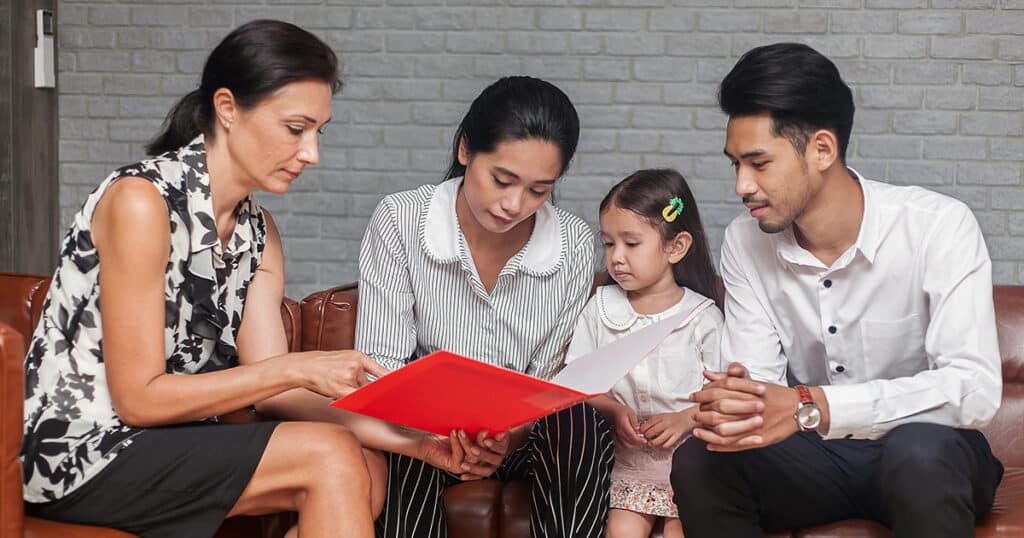If you’re thinking about using the services of a child psychologist, or even becoming one yourself, you may wonder what does a child psychologist do on a daily basis?
A child psychologist uses therapeutic techniques to help children and their families address emotional, behavioral, and developmental issues. They may conduct diagnostic evaluations, provide individual and family therapy, and offer support and guidance to parents and other caregivers.
Working with kids and their parents to aid child development is basically the role of a child psychologist. They use knowledge of psychology and therapy methods to hopefully help kids overcome challenges and reach their potential.
Let’s further explore the role of child psychologists. Here are main duties of the job.
1. Assess Potential Disorders

A child psychologist may also be called a pediatric psychologist or developmental psychologist. One of their main duties is to assess mental, emotional, and behavioral disorders in children and adolescents.
As a professional in this field, a child may present to you after, for example, being referred by their treating physician or being brought in by a parent.
Among the first steps you may take is to conduct an initial assessment of the child. You could interview the child and their parents, observe the child, and administer some standardized tests. Key elements include the following.
- Interviews: Interview the child, their parents, and other significant people in the child’s life, such as teachers or caregivers. Gather information about the child’s symptoms, medical history, family history, and developmental history.
- Behavioral observation: Observe the child in different settings, such as home, school, or during therapy sessions, to gather information about behavior and symptoms.
- Standardized tests: Administer standardized tests, such as IQ tests, achievement tests, or personality tests, to assess the child’s cognitive functioning, academic skills, and personality traits.
- Other assessments: Other assessments may be applied as well, such as rating scales or checklists, to gather information about symptoms, behaviors, and functioning.
- Review medical records or previous assessments: Review any previous medical or psychological records, such as school or medical evaluations, to gather additional information about the child’s history and development.
A good child psychologist will also consider the child’s physical and social environment, including the family and school situation. These external factors can have a big impact on behavior and symptoms.
2. Diagnose Disorders
Based on the information gathered in assessing a child, a developmental psychologist may make a diagnosis of any mental, emotional, or behavioral disorders. The practitioner will evaluate the child’s symptoms, behaviors, and functioning in different areas of life. From this evaluation, it will be determined if the child meets the criteria for a specific disorder.
Making a diagnosis of a mental disorder requires knowledge, training, experience and clinical judgement. The diagnosis will be based on the criteria of the Diagnostic and Statistical Manual of Mental Disorders (DSM-5); the standard classification of mental disorders. Note that diagnosis can be a complex process and may involve multiple evaluations over time to ensure the diagnosis is accurate.
A child psychologist may also reach other conclusions about a child’s emotional or behavioral issues. Examples of alternative conclusions are that the child’s difficulties:
- stem from a specific developmental stage and may improve with time and maturity;
- are related to environmental factors, such as stress or trauma, and can be addressed through therapy or interventions to improve the child’s living situation;
- are related to a medical condition, such as a brain injury or neurological disorder, and may require treatment or management from a medical specialist; or
- are related to poor parenting or other issues within the family system, and may require group therapy or other interventions to address underlying issues.
The psychologist may reach a conclusion that the child does not have a mental disorder, but that they are going through a difficult time and need additional support.
3. Provide Therapeutic Treatment

Depending on the particular diagnosis, a developmental psychologist has an arsenal of therapeutic treatment options available. These are needed to address the myriad of potential conditions.
Child psychologists encounter numerous mental health conditions and other issues, such as attention-deficit/hyperactivity disorder (ADHD), anxiety disorders, autism spectrum disorder, behavioral problems, depression, family problems, learning disorders, parent-child conflicts, social skills difficulties, and trauma and abuse.
In therapy, kids talk and learn how to work out their problems. Going to therapy helps them cope better, communicate better, and do better.
Kids Health
Treatment may include a combination of the following:
- Cognitive-behavioral therapy (CBT) to help children identify and change negative thoughts and behaviors
- Behavioral therapy to address specific problems such as defiance or aggression
- Family therapy to improve communication and relationships within the family
- Play therapy to help children express themselves and work through their issues
- Medication may be prescribed to help manage symptoms of certain conditions such as ADHD or anxiety
- Social skills training to improve children’s ability to interact with others
- Support and guidance for parents to help them understand and support their child’s needs.
CBT, behavioral therapy, family therapy, and play therapy are all forms of talk therapy, which helps children and families work through emotional and behavioral issues. Medication may be prescribed as an adjunct therapy to help manage symptoms of certain conditions such as ADHD or anxiety. Social skills training and parent guidance are also considered therapeutic treatments.
A child psychologist typically works as part of a team. Examples of fellow professionals who may be part of the team and treatment plan include: occupational therapist, parent and caregivers, pediatrician or psychiatrist (who can prescribe medications), school counselor, social worker, special education teacher, and speech therapist.
4. Work with Parents and Caregivers

Child psychologists often work closely with parents and caregivers to help them understand and manage their child’s condition. The practitioner will educate them on the child’s diagnosis, and offer strategies for managing symptoms and behavior.
Child psychologists consult with parents to help them understand the child’s developmental needs. They offer guidance on how to support the child’s social, emotional and cognitive development. They may discuss how to communicate effectively with their child, and create a supportive home environment.
Psychologists may also work with parents to help them develop effective parenting skills and cope with the stress of caring for a child with a mental health condition. Parents sometimes also need help with personal issues that may be impacting their ability to parent effectively.
5. Collaborate with Other Professionals
A child psychologist often works as part of a multidisciplinary team of professionals. He or she may collaborate with teachers, physicians, social workers, and other mental health professionals to ensure that the child’s needs are being met in all areas of their life.
For example, a developmental psychologist may work with a child’s teacher to provide strategies for managing symptoms in the classroom setting, or may work with a physician to coordinate medication management.
Collaboration with fellow professionals allows for a more holistic approach to treatment, taking into account the child’s physical, emotional, and social needs.
A child psychologist may also consult with school counselors or school psychologists, to provide support and guidance on how to support the child academically and socially. School is a big part of a child’s life and these involvements help ensure the child receives appropriate services and accommodations.
Additional professionals may be involved too, such as occupational therapists, speech therapists, or other specialists. They may address any other concerns or issues that may be impacting the child’s overall well-being. A collaborative approach ensures that the child receives the most comprehensive and effective treatment possible.
6. Conduct Scientific Research
As a child psychologist, all or part of your job may be to conduct scientific research on child development and mental health. Child psychology is listed as field of study in psychology in the comprehensive Lerna Courses guide. You may help further our understanding of the causes and treatments of mental health disorders in children.
Researchers work in settings such as universities, hospitals, or research institutions. They use research methods that include surveys, experiments, case studies, and observational studies, to collect data and analyze the information.
Research can take many forms, including basic research that aims to understand the underlying mechanisms of child development and mental health. There is also applied research that aims to evaluate the effectiveness of different interventions or treatments.
7. Train Related Professionals
Child psychologists often provide consultation and training to people who work with children, such as teachers, social workers, physicians, and other mental health professionals.
They may offer advice or instruction on how to recognize and address mental health issues, as well as strategies to manage symptoms and behavior. Training may also cover how to conduct assessments and evaluations, and use evidence-based treatments.
Child psychologists may also provide consultation to schools and other organizations that serve children, such as after-school programs or youth sports leagues, to help them promote health and well-being. The education efforts may extend to professionals in related fields, such as child welfare or juvenile justice.
8. Work on Early Intervention

Some child psychologists develop and implement prevention and early intervention programs to address mental health concerns in children. These programs aim to identify children at risk and provide early support.
Prevention activities include providing education and information to parents, teachers, and other adults who interact with children. A child psychologist may also develop and implement school-based programs to promote health and well-being, such as social-emotional learning programs or resilience-building programs.
Early intervention programs address mental health issues as soon as they’re identified, often before they become severe. This can include providing individual or group therapy, or counseling. Psychologists may also work with families and caregivers to provide support and guidance on how to manage and cope with their child’s condition.
9. Support Families in Crisis
Child psychologists guide families in crisis situations, such as when a child is experiencing a mental health crisis, or when a family is dealing with a traumatic event.
When working with families in crisis, a child psychologist can offer crisis counseling, trauma-focused therapy, and support groups. They may also work with professionals, such as crisis responders, to provide a coordinated response.
10. Do Community Outreach
Child psychologists may participate in community outreach programs to raise awareness about child mental health and promote access to services. This can include providing education and information to parents, caregivers, and community members on: (a) the signs and symptoms of psychological conditions in children; and (b) how to access services.
In this role, a psychologist may work with community organizations, such as schools, faith-based organizations, and youth sports leagues to provide information and resources. They may train and consult with professionals such as teachers, social workers, and community health workers.
Another service is to provide screening and assessment to children and families in underserved or under-resourced communities. This can help to identify children who are at risk of developing mental health problems and facilitate early intervention.
Myths and Facts
Here are some common misperceptions about child psychology and the truthful facts.
Myth 1: Child psychologists are only concerned with diagnosing and treating disorders.
Fact: Child psychologists are trained to work with children and adolescents to help them overcome emotional, behavioral, and mental health issues. This includes not only diagnosing and treating disorders, but also promoting healthy development and well-being.
Myth 2: Child psychology is only for children with severe mental health conditions.
Fact: Child psychology is not just for children with severe mental health conditions. Child psychologists work with diverse clients, including young people experiencing common challenges such as difficulty with school, friendship, or family dynamics. They also work with kids dealing with more serious issues such as abuse, trauma, or severe disorders.
Myth 3: Child psychology is only for children and adolescents.
Fact: Child psychology is not only for children and adolescents, but also for their families and caregivers. Child psychologists often work with parents, caregivers and other family members to help them understand and support their child’s needs. They may also provide guidance on how to manage and cope with the child’s condition, and may work with families to develop effective parenting skills.


Child development is at the heart of this profession. In a child psychology program, students learn about the physical, cognitive, emotional, and social development of kids.